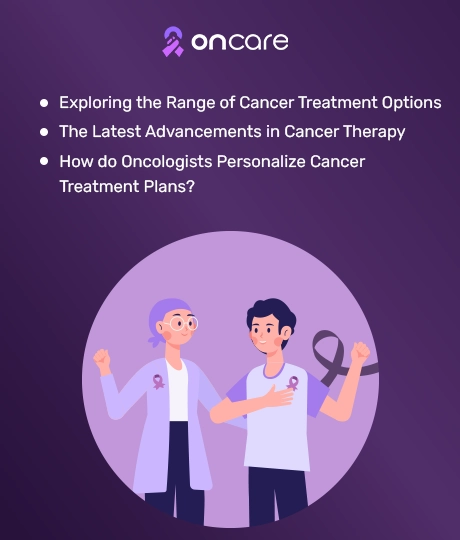Which Cancer Therapy Is Right for You? Insights from Oncologists

Cancer treatment options have evolved significantly over time, offering cases a wide range of choices for remedial approaches. Determining the right treatment for an individual depends on numerous factors, such as the type of cancer, its stage, and the case’s overall health. For those facing cancer, Oncare provides a comprehensive range of cancer treatments, offering acclimatized, affordable care to ensure the best possible issues. With options like radiation remedy, chemotherapy, immunotherapy, and radiotherapy, it can be delicate to know which one is right for you.
Let’s take a close look at these curatives and explore how oncologists epitomize care to meet your requirements.
Exploring the Range of Cancer Treatment Options
Choosing the right cancer therapy treatments can significantly affect the outcome of a patient's cancer journey. The therapy selection process is multifaceted, and different cancers respond to different treatments. Below are some of the most commonly used therapies in cancer treatment:
Chemotherapy
This form of cancer treatment uses powerful drugs to kill or slow the growth of cancer cells. Chemotherapy is widely used to treat a variety of cancers, including those that have spread to other parts of the body. The drugs used in chemotherapy can target cancer cells throughout the body, which makes it an effective treatment for cancers like breast cancer and ovarian cancer. However, it comes with potential side effects, including nausea, fatigue, and a lowered immune system, which is why it’s typically combined with other treatments like radiation therapy or immunotherapy.
Also Read : Understanding Chemotherapy: A Comprehensive Guide
Radiation Therapy (Radio Therapy)
Also known as radiotherapy, this treatment uses high-energy radiation to target and kill cancer cells or shrink tumors. This form of treatment is commonly used for localized cancers and is particularly effective in cases of breast cancer, lung cancer, and throat cancer. Radiation therapy can be used alone or in combination with other treatments, such as chemotherapy, to enhance its effectiveness. At Oncare, radiation therapy is delivered with precision to minimize damage to healthy tissues surrounding the tumor.
Also Read : Understanding Radiation Therapy: What It Is and How It Works
Immunotherapy
Immunotherapy has emerged as one of the most revolutionary cancer therapies in recent years. This treatment works by stimulating the body's immune system to recognize and fight cancer cells more effectively. Immunotherapy has shown tremendous promise in treating cancers like melanoma, lung cancer, and bladder cancer. Unlike traditional therapies that directly attack the cancer cells, immunotherapy boosts the body's ability to attack the cancer from within. At Oncare, we use immunotherapy as part of personalized treatment plans, ensuring patients receive the most effective therapy based on their cancer type and progression.
Also Read : What is Immunotherapy? Types, Benefits & How It Works
Radio Therapy
Another form of radiation therapy, radiotherapy, refers specifically to radiation used to treat tumors with greater precision. It is a targeted approach that focuses on eliminating cancer cells while minimizing damage to surrounding healthy tissues. In cases where surgery is not an option, radiotherapy can be used to shrink tumors before surgery or as an alternative treatment when surgery is not viable. The flexibility of radiotherapy makes it suitable for various cancers, including prostate cancer, head and neck cancers, and certain types of breast cancer.
Oncare provides access to all of these cancer therapy treatments, and more in a manner that is both affordable and customized to each patient’s needs. Whether you are considering chemotherapy, immunotherapy, radiation therapy, or radiotherapy, our team of experienced oncologists will help guide you through the best treatment options for your cancer.

How do Oncologists Personalize Cancer Treatment Plans?
One of the key factors that set Oncare apart is the emphasis on personalized care. No two cancer patients are alike, which is why oncologists at our clinic work diligently to design a treatment plan that is tailored to each patient’s unique needs.
Here’s a breakdown of how oncologists personalize cancer treatment plans:
Initial Assessment
Oncologists begin by conducting a thorough evaluation of the patient’s cancer through various diagnostic tests, such as imaging, biopsies, and blood work. This helps determine the type, stage, and location of the cancer, providing essential information for tailoring a personalized treatment strategy.
Patient Health History
A crucial factor in personalization is understanding the patient’s overall health, including age, pre-existing medical conditions, and previous treatments. Oncologists take into account the patient’s lifestyle, preferences, and emotional well-being, ensuring that the chosen treatment aligns with their goals and quality of life.
Genetic Testing
In recent years, genetic testing has become an essential tool in cancer treatment planning. By analyzing the genetic makeup of the cancer cells, oncologists can identify specific mutations or genetic markers. This allows for the use of targeted therapies or immunotherapies that can more precisely attack cancer cells, increasing the chances of success and reducing unnecessary damage to healthy tissues.
Cancer-Specific Therapies
Different types of cancer respond to different treatments. For example, breast cancer may require hormone therapy or targeted treatments, while lung cancer may be treated with chemotherapy or newer immunotherapies. Oncologists assess the nature of the cancer, its growth patterns, and its response to certain therapies to select the most effective treatment options tailored to the cancer type.
Combination Approaches
Many cancers require a combination of therapies to effectively treat the disease. Oncologists may recommend combining chemotherapy with radiation therapy or even chemotherapy with immunotherapy, based on the cancer’s specific needs. By using multiple treatment modalities, oncologists can target cancer cells from different angles, maximizing the likelihood of successful treatment.
Side Effect Management
Personalizing treatment also involves addressing and minimizing the side effects that come with cancer therapies. Oncologists work closely with patients to adjust treatments when side effects become too severe. This may include dose adjustments, adding medications to alleviate symptoms, or exploring alternative treatments that are gentler on the body while still being effective in treating the cancer.
Ongoing Monitoring
The personalization of cancer treatment doesn’t stop once therapy begins. Oncologists continuously monitor the patient’s progress through regular check-ups, scans, and blood tests. If a patient’s cancer shows signs of resistance to a particular treatment, the oncologist may change the approach to ensure the best possible outcome.
The Latest Advancements in Cancer Therapy
The field of oncology is rapidly evolving, with new therapies and technologies emerging at a fast pace. One of the most promising advancements in cancer therapy is the development of immunotherapy. This innovative treatment works by strengthening the immune system to better fight cancer. Unlike traditional therapies that directly attack the tumor, immunotherapy trains the immune system to recognize and destroy cancer cells more efficiently. Oncare stays at the forefront of these developments, providing cutting-edge immunotherapy treatments to patients who may benefit from them.
Another significant advancement is in the realm of radiotherapy. New techniques, such as stereotactic body radiation therapy (SBRT), have made radiation therapy more precise and less invasive. This approach allows for high doses of radiation to be delivered directly to the tumor, with minimal exposure to surrounding healthy tissue. Our advanced radiation therapy options provide patients with safer and more effective treatments, improving overall treatment success.
Additionally, the integration of technology in cancer care has made it possible to personalize treatment plans with greater precision. Techniques such as molecular profiling and genetic testing allow oncologists to better understand the genetic makeup of a patient’s cancer and tailor therapeutic cancer treatments accordingly.
Conclusion
Choosing the right cancer therapy is critical to the success of your treatment. With options like chemotherapy, radiation therapy, immunotherapy, and radiotherapy, the key is personalization. At Oncare, experienced oncologists tailor each treatment plan based on your specific needs, ensuring the best possible care. With advanced treatments and a compassionate, patient-focused approach, we are dedicated to making your cancer care journey as smooth and effective as possible.
Frequently Asked Questions (FAQs)
The best therapy varies depending on the type and stage of cancer. Chemotherapy, radiation therapy, immunotherapy, and radiotherapy are commonly used, often in combination.
Oncologists recommend the most appropriate therapy based on the patient's cancer type, stage, and overall health, often using immunotherapy, chemotherapy, or radiation therapy.
While natural methods may support overall health, therapies like chemotherapy and radiation therapy are the most effective for destroying cancer cells. Always consult with an oncologist for the best approach.
There is no universal treatment for all cancers. The best therapy depends on the specific type of cancer and its progression, often requiring personalized treatment plans.
India boasts several highly qualified oncologists. Oncare provides access to expert oncologists who specialize in various cancer treatments.
Cancers such as pancreatic cancer are considered more difficult to treat due to late-stage diagnosis and resistance to traditional treatments. We at Oncare provide specialized care for even the most challenging cancers.
Immunotherapy is one of the most advanced therapies available today. It works by stimulating the immune system to better target and destroy cancer cells.
Oncologists may recommend stopping chemotherapy when it no longer provides benefits or when the risks outweigh the advantages. In such cases, alternative therapies such as immunotherapy may be considered.